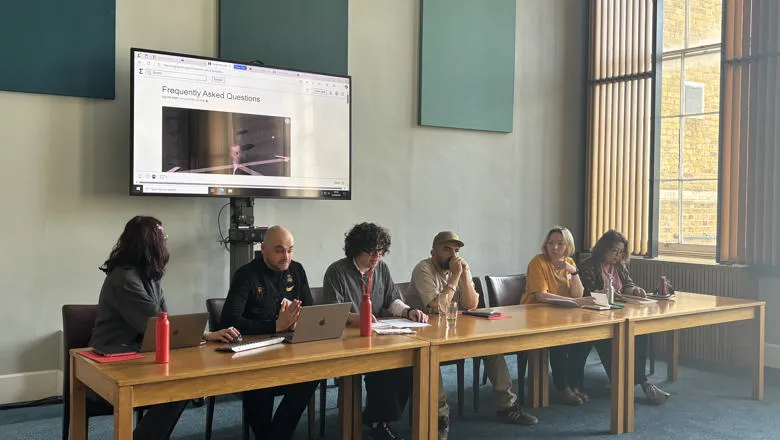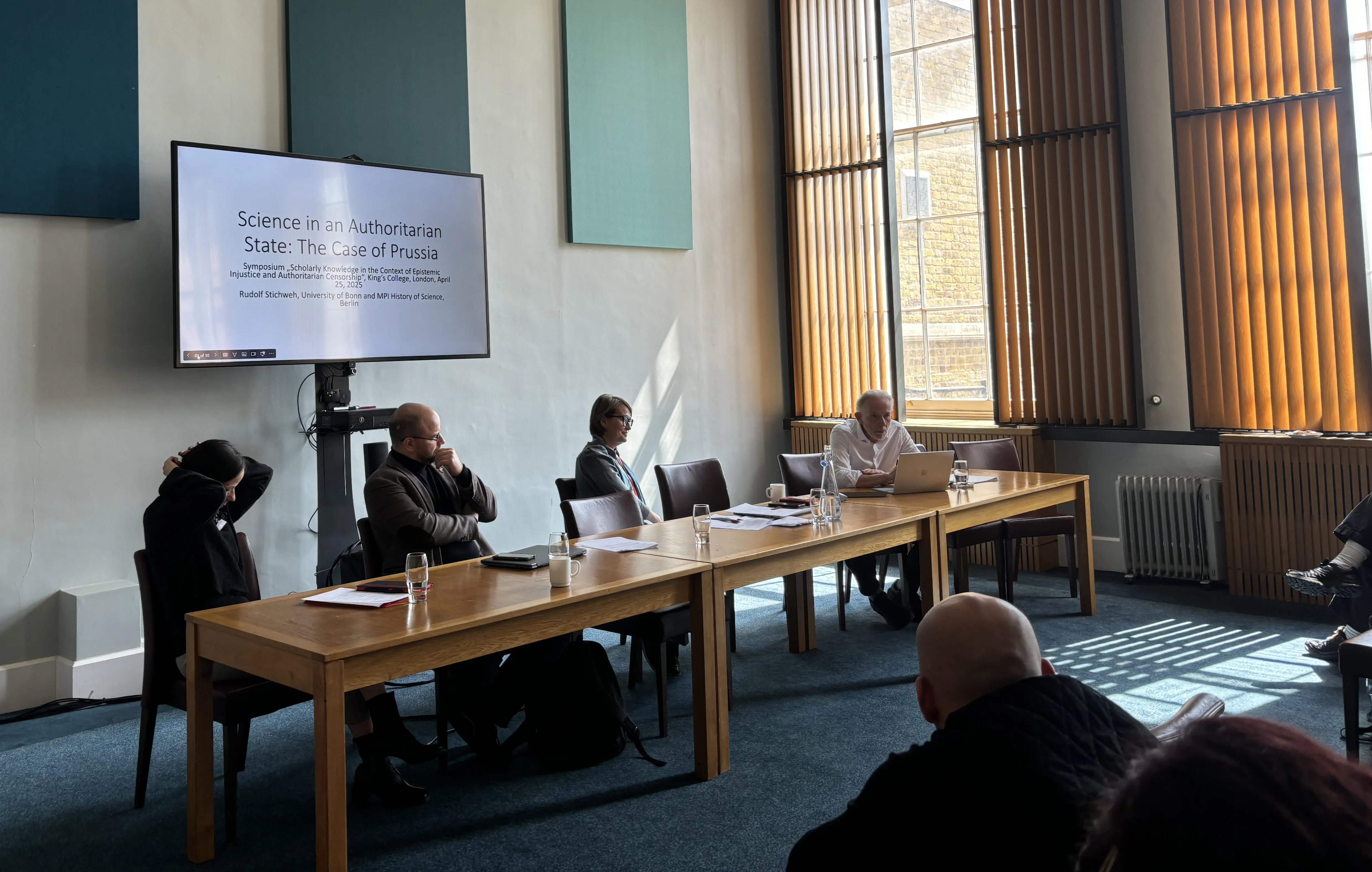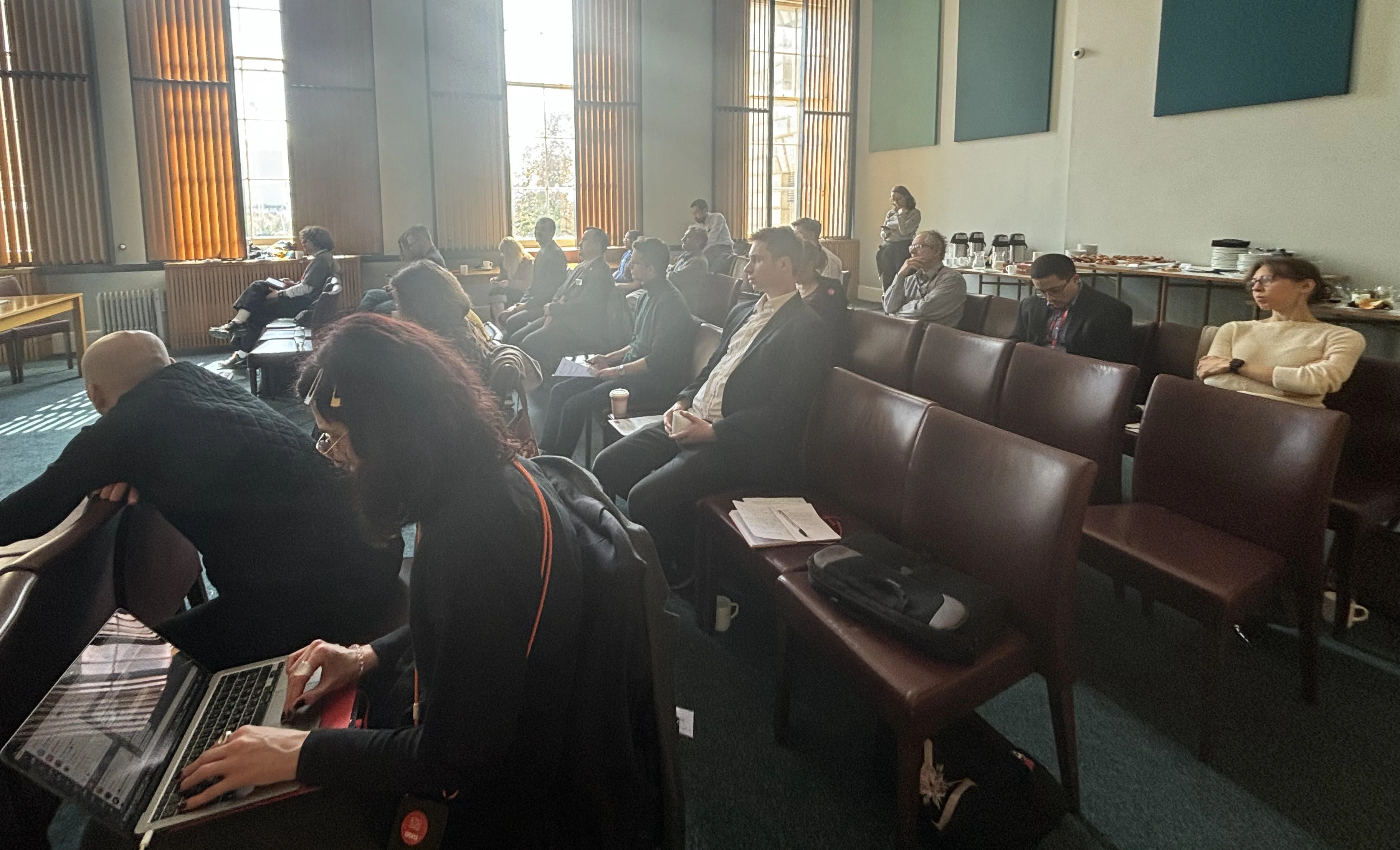09 July 2025
Annual symposium puts spotlight on injustice and censorship
Gulnaz Sharafutdinova, Iris Magne, Louis Benson and Jayantika Basudev
The King’s Russia Institute hosted its annual symposium, Scholarly Knowledge in the Context of Epistemic Injustice and Censorship, bringing together scholars from around the world.

The event focused on themes such as decolonial approaches to knowledge production in contemporary autocracies and the Global South, the impact of authoritarian politics on scholarship, and the historical and future trajectories of knowledge production under political pressure.
The first panel of the symposium, Para-Academic Knowledge Production and Dissemination, aimed to share the speakers’ personal experiences of fostering scholarly communities and developing research infrastructures that may complement or substitute existing academic institutions. Konstantin Koryagin and Anna Mikheeva opened the panel with a presentation on the academic media platform Syg.ma, which engages with topics at the periphery of mainstream academic discourse. They discussed how the platform's partnerships have enabled it to serve both as a community hub and as an archive.
In the second presentation, Maxim Alyukov and Svetlana Erpyleva discussed the methodological and ethical challenges of researching wartime Russia, focusing on how these challenges have influenced their work at the Public Sociology Laboratory. This was followed by Mohammad Salemy, who highlighted the role of and the idea behind The New Centre for Research & Practice in creating a new platform for researchers and students outside or in-between existing institutional frameworks.
Then, Ekaterina Kalinina from Stockholm University presented on the challenges of conducting research on activism and resistance in Russia after 2022. She particularly focused on the difficulty of conducting interviews and gathering data from civil society.
Finally, Gulzat Botoeva (Swansea University) and Sofya du Boulay (University of Sussex) presented the USTA Academic Mentorship project, which aims to empower Central Asian voices and address epistemic injustice in the region. The USTA Academic Mentorship is an initiative creating a Central Asian scholarly space through community building, publications, research support, and other initiatives.
Audience members then raised questions about the relationship between mainstream academia and para-academic initiatives, particularly focusing on shared concepts and terminologies across both spheres.
A quick coffee break allowed attendees a chance to catch up with one another, just before part two of the symposium took place. Egor Sokolov (University of Oxford) discussed the different philosophical approaches taken by Aleksei Losev and Sergei Averintsev during the Soviet period. The analysis of Losev’s use of Marxist terminology within his discourse was particularly interesting due to his conflict with communism—using Marxist dogma to express his own beliefs, which eventually led Soviet authorities to ban his book and suppress his ideas. The case of Averintsev highlighted a distinctive intellectual approach: by avoiding the Soviet order of discourse and living unaware of Soviet realities, he evaded ideological compromises within his academic thought. Egor Sokolov’s presentation underscored the lack of a clear boundary between free academic speech and fully restricted speech during Soviet rule, demonstrating the differing approaches to thought under Soviet authority.

Rudolph Stichweh (University of Bonn and Max Planck Institute for the History of Science) gave a compelling presentation on science in Prussia, where the establishment of three core institutions—military, educational institutions, and officialdom—allowed Prussia to become a powerhouse of social sciences and separated universities from authoritarianism. Rudolph’s comparison to modern-day China was particularly interesting, noting how strong bureaucracy has enabled the country to become the largest producer of social sciences in recent years.
Eszter Pál (Eötvös Loránd University) completed the second panel with a presentation on the decolonization and re-colonization of science, focusing on nascent developments within the Hungarian academic system. The increasing autocracy of Orbán’s regime has been evident in the erosion of trust between the government and institutions in Hungary. The government has changed the university model, privatizing institutions and allowing board members to be appointed for life. Eszter’s analysis was especially compelling as a financial crisis looms over independent institutions—only three remain across the country. The highly personalized regime has taken control of the sciences, asserting dominance over academic discourse and squeezing institutions that seek to preserve independent scientific knowledge.
The third section of the symposium focused on colonialism and knowledge production in the Global South, chaired by Marina Yusupova, lecturer at Edinburgh Napier University.
The first presentation in this panel was by Bakhtyzhan Kurmanov (University of Central Asia). His research focused on the intersection of memory, politics, and national identity in independent Kazakhstan. Using the Mink & Neymeyer framework to understand historical narrative and memory, he identified two opposing schools of historians—Old and New—and examined their politicization of the Golden Horde as a tool to legitimize political regimes. During the Soviet era, the Golden Horde was depicted as an enemy of both Russians and Kazakhs, thereby unifying them under a Soviet imperial narrative. Recent Kazakh administrations have also weaponized memory, with Nazarbayev continuing the Soviet paradigm, while Tokayev champions contested New School theories.
The second presentation was by Mariya Y. Omelicheva (National War College, National Defense University), focusing on challenges to decolonization in the North Caucasus. She emphasized how knowledge production is controlled by the hegemon—in this case, Russia—resulting in Russo-centric narratives and dominance of the Russian language. Russia also co-opts local knowledge to create an imperialist brand for purposes such as tourism. This has grown more important as sanctions and conflict have limited Russian access to foreign travel. Omelicheva also noted how resistance is weaponized: Russian anti-Western decolonization narratives, framed as sovereignty, are used to suppress distinct North Caucasian identities. Her presentation ended with poignant questions about what decolonization truly means and what its goals should be.
The final presentation in this session was given by Sofya du Boulay (University of Sussex). She examined power and knowledge production in the Azeri and Kazakh Khanates and their role in legitimizing provincial rulers. She began by exploring what constitutes legitimate order in modern autocracies and emphasized the importance of embedding historical depth in state narratives. Before Russian imperialism, the Azeri Khanate maintained links to Zoroastrianism and had remained largely independent for 500 years despite incorporation into Persian and Russian empires. The bureaucracy of Tsarist imperialism reshaped local governance, and integration into Russian aristocracy diminished the authority of Khans.
The final part of the day focused on censorship and science, chaired by King’s Russia Institute PhD candidate Iris Magne. Olga Bychkova provided a detailed analysis of climate research in Russia, highlighting obstacles since the invasion of Ukraine. The inability to access global satellite data and exclusion from international collaborations has severely limited Russian scientific development, particularly on climate issues.
Sanshiro Hosaka (University of Tartu) gave a fascinating account of Russian intelligence practices in higher education. He focused on the arrest of Viacheslav Morozov, a former political science professor at Hosaka’s university. Morozov’s recruitment by the Russian military intelligence agency (GRU) in the 1990s demonstrated how deeply Russian intelligence can infiltrate academia and remain hidden. Hosaka drew parallels to Soviet-era structures, where universities often housed KGB agents.
Diana Kudaibergenova (University College London) closed the symposium with a personal account titled “hiding behind the big A.” Her presentation explored the self-censorship she adopted to survive authoritarian scrutiny while conducting research. She described techniques such as translating notes into different languages or using euphemisms like “A” for authoritarianism. These methods provided a layer of safety and became habitual under repressive conditions, illustrating the psychological toll and strategic adaptations required for academic work under authoritarian regimes.

